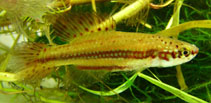| Family: |
Rivulidae (Rivulines), subfamily: Cynolebiinae |
| Max. size: |
4.34 cm SL (male/unsexed); 3.53 cm SL (female) |
| Environment: |
benthopelagic; freshwater, non-migratory |
| Distribution: |
South America: Brazil and Uruguay. |
| Diagnosis: |
Dorsal spines (total): 0-0; Dorsal soft rays (total): 16-19; Anal spines: 0-0; Anal soft rays: 22-25; Vertebrae: 28-30. Having faint spots restricted to the dorsal portion of the fin or caudal spots absent; pectoral fin length of male 18.6-22.6% SL; longitudinal rows of spots on body of male pale golden to greenish golden anteriorly and light blue posteriorly; pelvic fin length 6.8-8.3% SL in male, 6.4-7.5% in female; dark brown irregular marks on dorsum below dorsal fin of male, dorsal head profile of adult male slightly concave; lateral body stripes of male dark reddish brown; caudal fin or male without a bright blue zone along posterior margin of the fin; 11-14 supraorbital neuromasts and 1-3 neuromasts per scale of the lateral line (Ref. 42931). |
| Biology: |
Bottom spawner, 2 months incubation. Is very difficult to maintain in aquarium (Ref. 27139). |
| IUCN Red List Status: |
Least Concern (LC); Date assessed: 14 December 2020 Ref. (130435)
|
| Threat to humans: |
harmless |
Source and more info: www.fishbase.org. For personal, classroom, and other internal use only. Not for publication.
